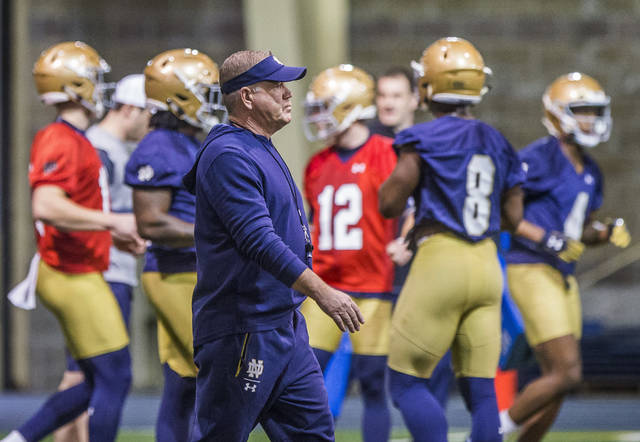
After the pandemic wiped out spring practice for most major college football teams, an NCAA plan to extend the preseason by two weeks could help coaches and players make up for the lost time.
The NCAA’s football oversight committee expects to finalize a plan on Thursday to allow teams to conduct up to 12 unpadded, slow-speed practices, also know as walk-throughs, during the 14 days before the typical preseason begins in August.
Teams will be permitted up to 20 hours per week of what the NCAA calls countable athletically related activities during those extra two weeks, leading into a normal 29-day preseason practice schedule. The walk-throughs will be part of those 20 hours per week, along with weight training, conditioning, film study and meetings. Players will not be permitted to wear pads or helmets during walk-throughs, which cannot exceed one hour per day.
Notre Dame coach Brian Kelly said the extra time on the field with a ball will be valuable for teaching schemes, but not necessarily for assessing player development.
“That going to be all the install that you didn’t get in in the spring is really going to take place during that period of time,” Kelly said Tuesday. “They won’t be an opportunity to see skills on display.”
The football oversight committee has been circulating its proposed schedule to NCAA members as a way to encourage feedback. West Virginia athletic director Shane Lyons said he doesn’t expect much to change before it is taken to the Division I Council for approval next week. The council meets June 17.
“I think there’s been a lot of collaboration among the conferences,” Lyons said.
Schools have started this week bringing their football players back to campus for voluntary workouts — mostly weight training and conditioning — in team facilities. Players are being tested and screened for COVID-19 and will continue to be monitored for the coronavirus.
Under the oversight committee’s plan, this period of voluntary activities would run until about July 12, depending on the exact date of a team’s opening game.
That will be followed by two weeks of summer access, which usually happens earlier in the year. During that time, coaches can require up to eight hours per week of weight training, conditioning and film study. Lyons said if any tweaks are made to the plan before it goes to the council they would likely be made to this two-week period.
Around July 24, the meetings and walk-throughs can begin. Then 29 days before a team’s first game — Aug. 7 if the opener is Sept. 5 — the usual preseason practice period starts.
“It all gives us a little bit of relief knowing the campuses are starting to reopen and these student-athletes are back working out on campus,” Lyons said
____
Follow Ralph D. Russo at https://twitter.com/ralphDrussoAP and https://appodcasts.com/category/ap-top-25-college-football/
___
More AP college football: https://apnews.com/APTop25CollegeFootballPoll and https://apnews.com/Collegefootball and https://twitter.com/AP_Top25


